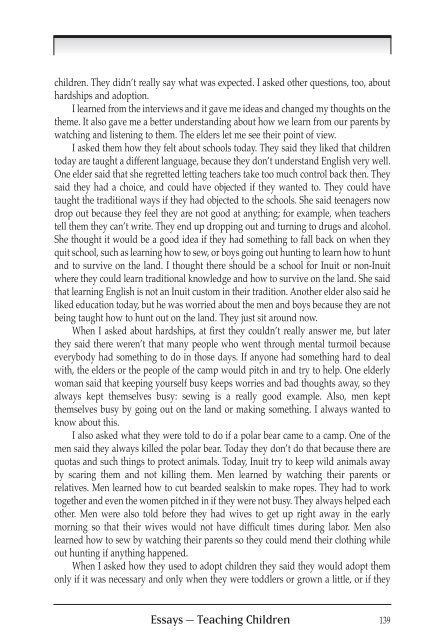Introduction-E
Introduction-E
Introduction-E
Create successful ePaper yourself
Turn your PDF publications into a flip-book with our unique Google optimized e-Paper software.
children. They didn’t really say what was expected. I asked other questions, too, about<br />
hardships and adoption.<br />
I learned from the interviews and it gave me ideas and changed my thoughts on the<br />
theme. It also gave me a better understanding about how we learn from our parents by<br />
watching and listening to them. The elders let me see their point of view.<br />
I asked them how they felt about schools today. They said they liked that children<br />
today are taught a different language, because they don’t understand English very well.<br />
One elder said that she regretted letting teachers take too much control back then. They<br />
said they had a choice, and could have objected if they wanted to. They could have<br />
taught the traditional ways if they had objected to the schools. She said teenagers now<br />
drop out because they feel they are not good at anything; for example, when teachers<br />
tell them they can’t write. They end up dropping out and turning to drugs and alcohol.<br />
She thought it would be a good idea if they had something to fall back on when they<br />
quit school, such as learning how to sew, or boys going out hunting to learn how to hunt<br />
and to survive on the land. I thought there should be a school for Inuit or non-Inuit<br />
where they could learn traditional knowledge and how to survive on the land. She said<br />
that learning English is not an Inuit custom in their tradition. Another elder also said he<br />
liked education today, but he was worried about the men and boys because they are not<br />
being taught how to hunt out on the land. They just sit around now.<br />
When I asked about hardships, at first they couldn’t really answer me, but later<br />
they said there weren’t that many people who went through mental turmoil because<br />
everybody had something to do in those days. If anyone had something hard to deal<br />
with, the elders or the people of the camp would pitch in and try to help. One elderly<br />
woman said that keeping yourself busy keeps worries and bad thoughts away, so they<br />
always kept themselves busy: sewing is a really good example. Also, men kept<br />
themselves busy by going out on the land or making something. I always wanted to<br />
know about this.<br />
I also asked what they were told to do if a polar bear came to a camp. One of the<br />
men said they always killed the polar bear. Today they don’t do that because there are<br />
quotas and such things to protect animals. Today, Inuit try to keep wild animals away<br />
by scaring them and not killing them. Men learned by watching their parents or<br />
relatives. Men learned how to cut bearded sealskin to make ropes. They had to work<br />
together and even the women pitched in if they were not busy. They always helped each<br />
other. Men were also told before they had wives to get up right away in the early<br />
morning so that their wives would not have difficult times during labor. Men also<br />
learned how to sew by watching their parents so they could mend their clothing while<br />
out hunting if anything happened.<br />
When I asked how they used to adopt children they said they would adopt them<br />
only if it was necessary and only when they were toddlers or grown a little, or if they<br />
Essays – Teaching Children 139


